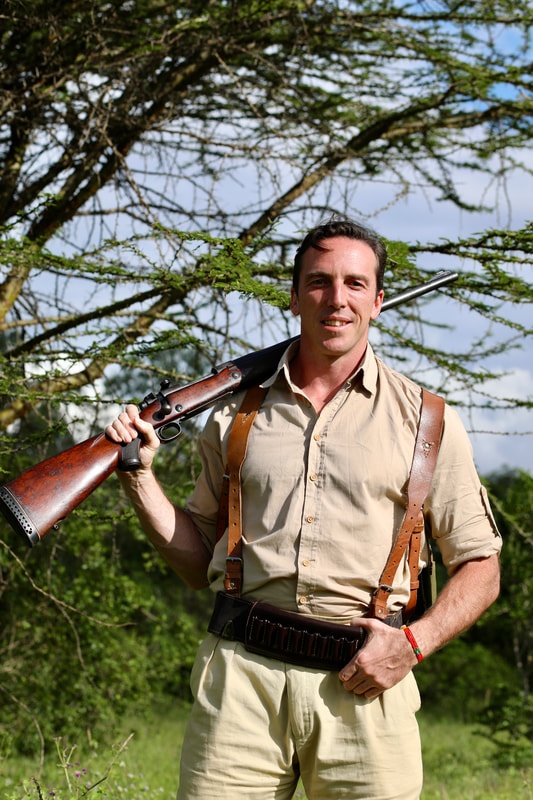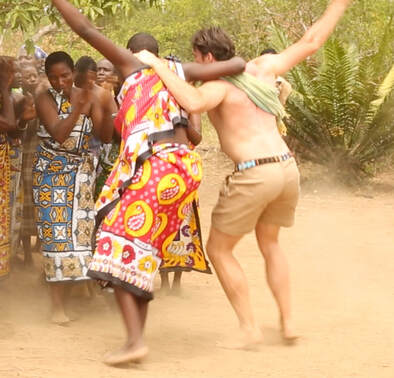
Gareth Roriston Honed his skills in wildlife as a warden for the privately owned Galana Wildlife Conservancy, a 65,000-acre conservation area in Kenya. Unfenced and adjoining the expansive Tsavo national parks complex, the conservancy sits in a vast tract of wildland larger than many small nations. For perspective this swathe of wilderness is larger than the countries of Belgium, Israel or Wales. With 65’000 acres of this notably remote, rugged, and wild country to patrol and with only a skeleton crew of three staff Gareth had a steep learning curve, regarding bush life.
Gareth is a professionally trained walking safari guide, having completed his training in South Africa. Despite Kenya boasting considerable home-grown talent with many remote living bush-wise citizens, Kenya has no accreditation programmes for walking safari guides, and the government enforces exceedingly strict restrictions on firearms ownership – the rifle being a crucial tool for a properly conducted walking safari. Consequently, walking safaris are seldom offered in Kenya. Most safari operators are restricted to vehicles and are unable to provide the walking experience. Gareth holds the rare distinction of being one of a select few individuals recommended as an armed walking guide by the government’s tourist board, the Kenya Tourism Federation (KTF).
Kenya is arguably the finest safari destination on the continent, renowned for its unique and dense wildlife populations, its iconic landscapes in huge and remote wilderness areas, the natural sense of welcome proffered by its peoples and its history of high levels of service and hospitality, which all began here over a century and a half ago, when European adventurers inspired by the luxurious style of the Arabian tented caravan, combined this with a spirit of exploration and a healthful reprieve from the ever increasing urbanisation of the Western World. Today experiencing Kenya’s beauty, in this authentic, luxurious, mobile style on foot, is a rare and unique privilege.
Gareth is a professionally trained walking safari guide, having completed his training in South Africa. Despite Kenya boasting considerable home-grown talent with many remote living bush-wise citizens, Kenya has no accreditation programmes for walking safari guides, and the government enforces exceedingly strict restrictions on firearms ownership – the rifle being a crucial tool for a properly conducted walking safari. Consequently, walking safaris are seldom offered in Kenya. Most safari operators are restricted to vehicles and are unable to provide the walking experience. Gareth holds the rare distinction of being one of a select few individuals recommended as an armed walking guide by the government’s tourist board, the Kenya Tourism Federation (KTF).
Kenya is arguably the finest safari destination on the continent, renowned for its unique and dense wildlife populations, its iconic landscapes in huge and remote wilderness areas, the natural sense of welcome proffered by its peoples and its history of high levels of service and hospitality, which all began here over a century and a half ago, when European adventurers inspired by the luxurious style of the Arabian tented caravan, combined this with a spirit of exploration and a healthful reprieve from the ever increasing urbanisation of the Western World. Today experiencing Kenya’s beauty, in this authentic, luxurious, mobile style on foot, is a rare and unique privilege.

The most important chapter in Gareth’s bushcraft education unfolded at the Galana Wildlife Conservancy, where he encountered the local Watha community during his tenure as warden. The Watha are traditionally a hunter-gatherer people, highly specialised in the pursuit of big game using large powerful bows. The elephant holds significant cultural importance for them, and they are uniquely adept at interpreting elephant behaviour, possessing a profound understanding of the elephant’s mind and habits. They have an expert ability to discern detailed information about individuals merely by tracks and signs. Though venerating the elephant, their skills are no less elite in the tracking and understanding of every creature with which they share the land. Impressed by their unparalleled knowledge of bushcraft and big game behaviour, Gareth has spent hundreds of hours on foot in big game country under the tutelage of Watha elders, avidly absorbing everything he could about their deep connection to each aspect of the environment.
Gareth acquired proficiency in their tracking methods, customs, and dances as part of this education. As time passed and bonds grew closer Gareth partook in cultural rites of passage and integrated into the community. Such rites of passage included demonstrating an ability to make fire by hand friction in the traditional style, leading a tracking party to an individual elephant by deciphering the individuals tracks from others in the herd, interpreting bird signs and learning dances in which nuances of animal behaviour must be impersonated. Dance is a teaching method used by the Watha in place of textbooks. In yesteryear members of the community were actively sought as trackers and guides by professional hunters owing to the universal agreement that they were the best on the continent. Since the blanket hunting ban of the 1970’s the community found themselves disenfranchised. Today Gareth supports the community by employing his friends as trackers for walking safaris allowing their cultural skills a professional relevance in this rapidly changing world.
Gareth acquired proficiency in their tracking methods, customs, and dances as part of this education. As time passed and bonds grew closer Gareth partook in cultural rites of passage and integrated into the community. Such rites of passage included demonstrating an ability to make fire by hand friction in the traditional style, leading a tracking party to an individual elephant by deciphering the individuals tracks from others in the herd, interpreting bird signs and learning dances in which nuances of animal behaviour must be impersonated. Dance is a teaching method used by the Watha in place of textbooks. In yesteryear members of the community were actively sought as trackers and guides by professional hunters owing to the universal agreement that they were the best on the continent. Since the blanket hunting ban of the 1970’s the community found themselves disenfranchised. Today Gareth supports the community by employing his friends as trackers for walking safaris allowing their cultural skills a professional relevance in this rapidly changing world.
